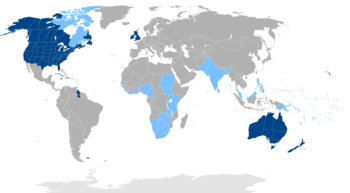Anglosphere
![]()
This article or section is still missing the following important information:
Anglosphere as a complete socio-political-cultural concept; see discussion page, en:Anglosphere + Anglo-Saxon.
Help Wikipedia by researching and adding them.
Anglosphere (neologism from "anglo" (English, Anglo-Saxon) and "sphere" (sphere of influence); term coined by the author Neal Stephenson) refers collectively to the states,
- where the English language is spoken by the vast majority of the population (native or first language) and/or is an official language, and
- which predominantly share a common cultural heritage.
The Anglosphere in the narrower sense thus includes - on the basis of their linguistic (→ English-speaking area), historical (→ British Empire), legal (→ Common Law), economic (→ Anglo-Saxon model) and political commonalities and similarities -
- the British Isles (United Kingdom and Ireland) and from them
- the United States,
- Canada (excluding Québec),
- Australia and
- New Zealand.
The fact that these states have traditionally been military allies is also underlined by the term.

blue : states where English is the first language of a large part of the population and where there is a common cultural heritage going back to the British Isles (Anglosphere in the narrower sense) light blue: former British colonies or protectorates where the English language is used as a lingua franca but where there is no or only a marginal common cultural heritage with the former British colonial power (Anglosphere in the broader sense)
"Anglosphere" as a political buzzword.
The English-language term anglosphere has often been used by Anglo-Saxon political currents as a fighting term in connection with a stronger detachment of Great Britain from continental Europe and the EU towards North America, especially the USA.
See also
- Commonwealth of Nations
Questions and Answers
Q: What is the Anglosphere?
A: The Anglosphere is a group of English-speaking countries with a shared cultural heritage.
Q: Which countries are included in the Anglosphere?
A: The countries included in the Anglosphere are the United Kingdom, the United States, Canada (excluding Quebec and Nunavut), Australia, New Zealand, and Ireland (a former Commonwealth member).
Q: Is Quebec considered part of the Anglosphere?
A: No, Quebec is not considered part of the Anglosphere because it is a majority French-speaking province.
Q: Is Nunavut part of the Anglosphere?
A: No, Nunavut is not considered part of the Anglosphere because it is a majority Inuit-speaking territory.
Q: When was the term "Anglosphere" invented?
A: The term "Anglosphere" was invented at the end of the 20th century.
Q: What is the cultural heritage shared by the countries in the Anglosphere?
A: The countries in the Anglosphere share an English-speaking cultural heritage.
Q: Was Ireland ever a Commonwealth of Nations member?
A: Yes, Ireland was a former member of the Commonwealth of Nations and is considered part of the Anglosphere.
Search within the encyclopedia